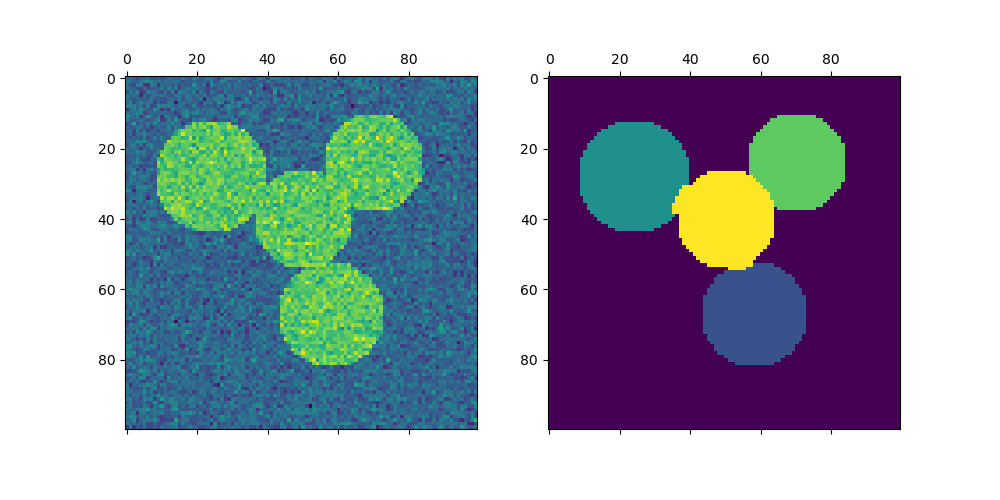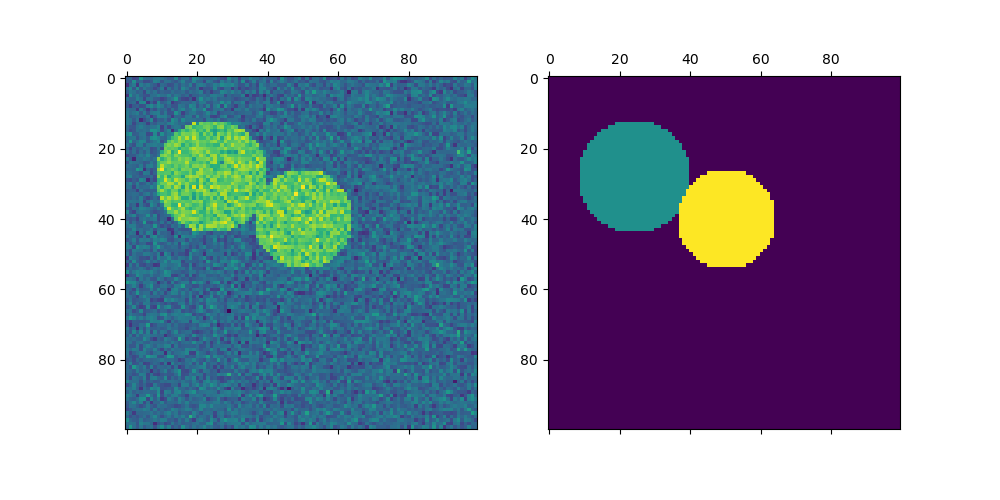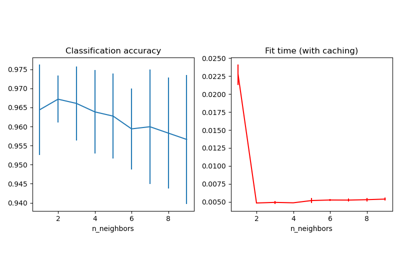注意
转到结尾 下载完整的示例代码。或通过 JupyterLite 或 Binder 在您的浏览器中运行此示例。
用于图像分割的谱聚类#
在此示例中,生成一个包含连接圆的图像,并使用谱聚类来分离这些圆。
在这种设置下,谱聚类 方法解决了所谓的“归一化图割”问题:图像被视为连接体素的图,谱聚类算法相当于选择定义区域的图割,同时最小化沿割的梯度与区域体积的比率。
由于算法试图平衡体积(即平衡区域大小),如果我们采用不同大小的圆,则分割会失败。
此外,由于图像的强度或其梯度中没有有用的信息,我们选择在一个仅由梯度弱告知的图上执行谱聚类。这接近于执行图的 Voronoi 分区。
此外,我们使用物体的掩码将图限制在物体的轮廓上。在此示例中,我们感兴趣的是将物体彼此分离,而不是将其与背景分离。
# Authors: The scikit-learn developers
# SPDX-License-Identifier: BSD-3-Clause
生成数据#
import numpy as np
l = 100
x, y = np.indices((l, l))
center1 = (28, 24)
center2 = (40, 50)
center3 = (67, 58)
center4 = (24, 70)
radius1, radius2, radius3, radius4 = 16, 14, 15, 14
circle1 = (x - center1[0]) ** 2 + (y - center1[1]) ** 2 < radius1**2
circle2 = (x - center2[0]) ** 2 + (y - center2[1]) ** 2 < radius2**2
circle3 = (x - center3[0]) ** 2 + (y - center3[1]) ** 2 < radius3**2
circle4 = (x - center4[0]) ** 2 + (y - center4[1]) ** 2 < radius4**2
绘制四个圆#
img = circle1 + circle2 + circle3 + circle4
# We use a mask that limits to the foreground: the problem that we are
# interested in here is not separating the objects from the background,
# but separating them one from the other.
mask = img.astype(bool)
img = img.astype(float)
img += 1 + 0.2 * np.random.randn(*img.shape)
将图像转换为具有边缘梯度值的图。
from sklearn.feature_extraction import image
graph = image.img_to_graph(img, mask=mask)
采用梯度的递减函数,得到接近 Voronoi 分区的分割结果。
graph.data = np.exp(-graph.data / graph.data.std())
在这里,我们使用 arpack 求解器执行谱聚类,因为 amg 在此示例中数值不稳定。然后我们绘制结果。
import matplotlib.pyplot as plt
from sklearn.cluster import spectral_clustering
labels = spectral_clustering(graph, n_clusters=4, eigen_solver="arpack")
label_im = np.full(mask.shape, -1.0)
label_im[mask] = labels
fig, axs = plt.subplots(nrows=1, ncols=2, figsize=(10, 5))
axs[0].matshow(img)
axs[1].matshow(label_im)
plt.show()

绘制两个圆#
在这里,我们重复上述过程,但只考虑我们生成的前面两个圆。请注意,由于在这种情况下更容易平衡区域大小,因此这导致圆之间更清晰的分离。
img = circle1 + circle2
mask = img.astype(bool)
img = img.astype(float)
img += 1 + 0.2 * np.random.randn(*img.shape)
graph = image.img_to_graph(img, mask=mask)
graph.data = np.exp(-graph.data / graph.data.std())
labels = spectral_clustering(graph, n_clusters=2, eigen_solver="arpack")
label_im = np.full(mask.shape, -1.0)
label_im[mask] = labels
fig, axs = plt.subplots(nrows=1, ncols=2, figsize=(10, 5))
axs[0].matshow(img)
axs[1].matshow(label_im)
plt.show()

脚本总运行时间:(0 分钟 0.510 秒)
相关示例




